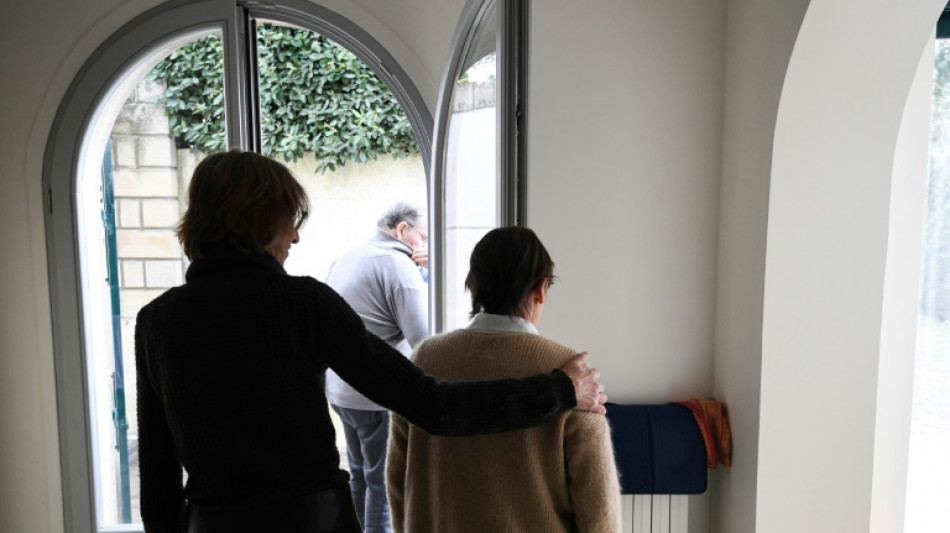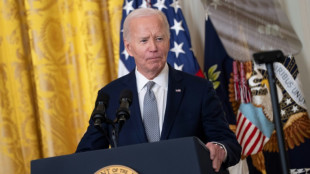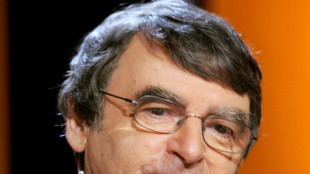
-
 Brazil says 2024 was its hottest year on record
Brazil says 2024 was its hottest year on record
-
Soldier in Vegas Tesla blast suffered PTSD, no 'terror' link: FBI

-
 Lake Placid chosen as Olympic venue super sub if gamble on Cortina backfires
Lake Placid chosen as Olympic venue super sub if gamble on Cortina backfires
-
'Luke the Nuke' still living his teenage darts dream

-
 MLB Dodgers agree to terms with South Korean infielder Kim
MLB Dodgers agree to terms with South Korean infielder Kim
-
Bellingham grabs Real Madrid late Valencia win after Vinicius red

-
 US Olympian Kerley facing charges after clash with Miami Beach police
US Olympian Kerley facing charges after clash with Miami Beach police
-
Teenage sensation Littler storms to world darts title

-
 Judge to sentence Trump before inauguration in hush money case
Judge to sentence Trump before inauguration in hush money case
-
Microsoft expects to spend $80 bn on AI this fiscal year

-
 AC Milan rally past Juventus to meet Inter in Italian SuperCup final
AC Milan rally past Juventus to meet Inter in Italian SuperCup final
-
Trump-backed Republican Johnson elected speaker of US House

-
 Gaza rescuers say about 30 killed as truce talks resume
Gaza rescuers say about 30 killed as truce talks resume
-
UK, Germany electricity cleanest on record in 2024

-
 Oil from Russian tanker spill reaches Sevastopol
Oil from Russian tanker spill reaches Sevastopol
-
Man arrested for supplying drugs to Liam Payne: Argentine police

-
 US House rejects Trump-backed speaker in first ballot
US House rejects Trump-backed speaker in first ballot
-
European ministers urge inclusive transition on Syria visit

-
 Rickelton hits Test best as South Africa on top against Pakistan
Rickelton hits Test best as South Africa on top against Pakistan
-
Lebanon minister says working to 'resolve' Syria's new entry restrictions

-
 US announces $306 mn in new bird flu funding
US announces $306 mn in new bird flu funding
-
Salah targets Premier League glory in 'last year' at Liverpool

-
 Rockets fired from Gaza as Israeli strikes kill 16, rescuers say
Rockets fired from Gaza as Israeli strikes kill 16, rescuers say
-
Marseille coach De Zerbi defends 'strong' Ligue 1

-
 Rickelton, Bavuma tons put South Africa in strong position
Rickelton, Bavuma tons put South Africa in strong position
-
Breeding success: London zoo counts its animals one-by-one

-
 Fofana could miss rest of Chelsea's season
Fofana could miss rest of Chelsea's season
-
Republican speaker, Trump face test in Congress leadership fight

-
 Man Utd 'starving for leaders' ahead of Liverpool clash: Amorim
Man Utd 'starving for leaders' ahead of Liverpool clash: Amorim
-
Alcohol should have cancer warning label: US surgeon general

-
 Biden blocks US Steel sale to Japan's Nippon Steel
Biden blocks US Steel sale to Japan's Nippon Steel
-
Wall Street stocks bounce higher, Europe retreats

-
 Neil Young says he will play Glastonbury after all
Neil Young says he will play Glastonbury after all
-
Frenchman Castera plots roadmap for Dakar success

-
 Doha hosts PSG clash with Monaco in French Champions Trophy
Doha hosts PSG clash with Monaco in French Champions Trophy
-
Hamilton 'excited for year ahead' after Ferrari switch

-
 Man City must 'think' about De Bruyne future: Guardiola
Man City must 'think' about De Bruyne future: Guardiola
-
Biden blocks US-Japan steel deal

-
 French police to face trial for 'suffocating' death
French police to face trial for 'suffocating' death
-
British novelist David Lodge dies aged 89

-
 Indonesia says 2024 was hottest year on record
Indonesia says 2024 was hottest year on record
-
South African Lategan wins Dakar Rally prologue

-
 Barca coach Flick optimistic but 'not happy' over Olmo situation
Barca coach Flick optimistic but 'not happy' over Olmo situation
-
Djokovic Australian Open preparations take hit with loss to Opelka

-
 Indian duo self-immolate in Bhopal waste protest
Indian duo self-immolate in Bhopal waste protest
-
Indian food delivery app rolls out ambulance service

-
 Arsenal must 'flip coin' in Premier League title race, says Arteta
Arsenal must 'flip coin' in Premier League title race, says Arteta
-
European stock markets retreat after positive start to year

-
 World food prices dip 2% in 2024: FAO
World food prices dip 2% in 2024: FAO
-
The horror of Saydnaya jail, symbol of Assad excesses


US approves new drug to treat Alzheimer's disease
The US Food and Drug Administration on Friday approved a highly anticipated new drug designed to slow cognitive decline in patients in mild and early stages of Alzheimer's disease.
The FDA approval of the drug, Leqembi, also known as lecanemab, comes just days after the regulatory agency was harshly criticized in a congressional report for its green-lighting of another Alzheimer's drug, Aduhelm.
And it was granted despite trial results showing the monoclonal antibody treatment carries risks of brain swelling and bleeding.
Both drugs were approved through an accelerated process that allows the FDA to fast-track approval of drugs for serious conditions where there is an unmet medical need.
Leqembi and Aduhelm, which were jointly developed by Japan's Eisai and Biogen of the United States, "represent an important advancement in the ongoing fight to effectively treat Alzheimer's disease," the FDA said in a statement.
"Alzheimer's disease immeasurably incapacitates the lives of those who suffer from it and has devastating effects on their loved ones," Billy Dunn of the FDA's Center for Drug Evaluation and Research said in a statement.
Leqembi, Dunn said, is "the latest therapy to target and affect the underlying disease process of Alzheimer's, instead of only treating the symptoms of the disease."
Approximately 6.5 million Americans suffer from Alzheimer's, which is characterized by memory loss and declining mental acuity.
Preliminary data from a trial of Leqembi was released in September and found it slowed cognitive decline in Alzheimer's patients by 27 percent.
The phase three trial involved nearly 1,800 people, divided between those given the drug and given a placebo, and ran over 18 months.
The complete trial data, published in the New England Journal of Medicine, raised concern about the incidence of "adverse effects" including brain bleeds and swelling.
The results showed that 17.3 percent of patients administered the drug experienced brain bleeds, compared with nine percent of those receiving a placebo.
And 12.6 percent of those taking the drug experienced brain swelling, compared with just 1.7 percent of those in the placebo group.
Deaths were reported at approximately the same rate in both arms of the trial of the drug.
- $26,500 a year -
In Alzheimer's disease, two key proteins, tau and amyloid beta, build up into tangles and plaques, known together as aggregates, which cause brain cells to die and lead to brain shrinkage.
Leqembi, which is administered intravenously once every two weeks, works by targeting amyloid.
In the trial, patients receiving Leqembi had a statistically significant reduction in brain amyloid plaque compared to the placebo arm, which had no reduction of amyloid beta plaque.
Biogen and Eisai previously brought Aduhelm to market, but there was significant controversy over whether it worked, and its approval in 2021 led to three high-level resignations in the FDA.
A US congressional investigation said the accelerated approval process for Aduhelm, the first drug approved in decades to treat Alzheimer's, was "rife with irregularities" and criticized both the agency and Biogen.
The Cambridge, Massachusetts-based Biogen set an "unjustifiably high price" for Aduhelm of $56,000 a year, the congressional report said.
Eisai said Leqembi would be priced initially at $26,500 per year and estimated that 100,000 Americans could be receiving the drug by three years from now.
Joanne Pike, president and CEO of the Alzheimer's Association, welcomed the approval of Leqembi but expressed concern that its high cost could put it out of reach of most Americans, particularly if it is not covered by Medicare, the government health insurance program for the elderly.
"People living with this fatal disease today do not have time to wait for a miracle drug or cure," Pike said in a statement.
A.Mahlangu--AMWN

